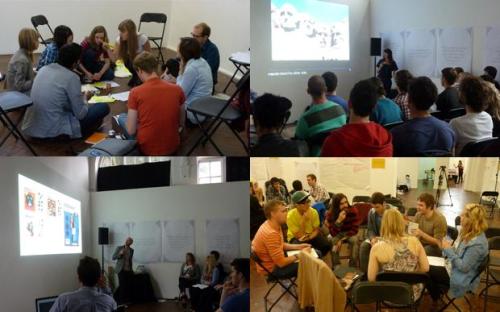 Professional degree awarding colleges/universities take pride on speaking about their students in terms of ‘Placement record percentage’, ‘Highest salary offer for Job’, and ‘Partner companies from industry’; but rarely speak about ‘employability’ and ‘personality development’ of students. ‘Placement cell’ in most engineering colleges acts more like a recruitment consultancy company providing ‘job search’ services to students. So, (1) how different is the term ‘Placement’ from ‘Employability’, (2) which one of the two above terms should the management board of engineering colleges give more focus, (3) what parameters distinguish professional degree courses from basic general degree courses, and (4) what add-on skills apart from scoring high in academic semester papers ought to be learned by engineering students before graduation?
Professional degree awarding colleges/universities take pride on speaking about their students in terms of ‘Placement record percentage’, ‘Highest salary offer for Job’, and ‘Partner companies from industry’; but rarely speak about ‘employability’ and ‘personality development’ of students. ‘Placement cell’ in most engineering colleges acts more like a recruitment consultancy company providing ‘job search’ services to students. So, (1) how different is the term ‘Placement’ from ‘Employability’, (2) which one of the two above terms should the management board of engineering colleges give more focus, (3) what parameters distinguish professional degree courses from basic general degree courses, and (4) what add-on skills apart from scoring high in academic semester papers ought to be learned by engineering students before graduation?
News media often talks about poor quality of graduates coming out of engineering colleges in India. Industry also cites that majority of graduating students do not possess clarity on engineering concepts and are not up to the basic level of employability skills. Both the technical education accreditation body ‘AICTE’ and respective management board of engineering colleges seem to focus more on academic contents plus infrastructure provision provided and at times on academic staff profiles, than personality development aspect needed for students to be an ‘Engineer’. ‘Placement service’ is about supporting students to get recruited by visiting companies at the college/university campus, and thus, focus for ‘placement cell’ in engineering college is rather on quick-fix approach to satisfy basic entry requirements mandated by recruiting companies on the attending engineering students to their placement process such as percentage score in semester exams, previous scores in school and higher secondary school levels, aptitude test conducted by the company, technical and HR interviews of the company, test on specific technical areas (e.g. programming language, technology domain). Hence, placement preparation activities by engineering students are portrayed as if an entirely different unrelated activity during the engineering study program from the ethos of learning semester papers.
‘Employability’ refers to enabling the student employable i.e. qualified and ready to work. Thus, it hints to grooming the student on three key aspects – (1) mindset/behavior attached to that specific engineering profession, (2) background knowledge and skills need to execute tasks in that specific profession, (3) awareness of industry culture and career growth patterns in that specific profession. Format and academic content of engineering degree programs in various colleges/universities are accredited by AICTE for maintaining quality. Some practical oriented skill training modules are inserted to the course program structure by respective engineering colleges (and universities where they are affiliated to) in order to accommodate practical reasoning skills onto theoretical concepts. Still, most engineering degrees are rather focused on ‘academic reasoning’ and ‘basic technical skills’, thereby lacking a sense to impart common sense skills/knowledge of actual industry requirements on engineering graduates. Employability services (if provided) ought to aim the much needed outcome of ‘what’s exactly expected of an engineering graduate by the current industry’ not just by focusing on ‘placement activities’ aspect.
It isn’t the mandate of any university (or college) to guarantee a job to students, though universities/colleges may advertise their student placement record to attract prospective students. Employability services are valued-added facilities provided to students that aim to connect the two mindsets of academic world and real industry world. Many engineering students (and few professionals even after working in industry for years) often get doubts ‘what that engineering job is about?’ and ‘is that profession really meant for him/her?’. Unlike basic general degree courses, professional degree courses ought to intend to create a professional out of a student at the end of that course program. Studying basic general degree courses is about curiosity to explore the knowledge aspect on a specific domain, whereas studying a professional degree is about applying the knowledge of understanding a specific domain onto some applied activities/outputs. Thus, imparting professional spirit much needed by the actual industry in addition to providing the academic knowledge and reasoning skills is very crucial for professional degree programs.
Engineering colleges/universities should provide equal focus to ‘employability agenda’ on par with ‘academic excellence agenda’. The Management of those institutions currently focus heavily on planning the successful conducting of ‘admission process for newly joining engineering students’, ‘semester classes by leading academic staffs’, ‘periodic examination for students’, ‘timely declaration of exam results and conformance to academic calendar for various curricular activities’, ‘living supports during the course of study and accommodation services at hostels’, etc. Moreover, in India, these engineering colleges/universities emphasize more on bachelor degree education and feed degree graduates to various companies at entry level engineering jobs, thereby sidelining priority on post-graduation (Master and PhD) levels esp. R&D activities and technological innovation. Some cash-rich engineering colleges/universities (including eminent management groups) do provide non-academic services such as ‘placement cell’, ‘social/local impact clubs’, ‘sports/entertainment facilities’ and ‘alumni engagement cell’.
A lot more needs to be done on ‘Employability’ agenda by engineering colleges/universities, if the intention of these institutions is to create a professional out of an engineering student and not just an engineering graduate with a degree similar to a basic general science degree. The term ‘engineering’ itself means ‘practical application of science to commerce or industry’. Employability is also about inspiring ‘enterprise’ agenda among engineering graduates so as to aim to setup startup technology companies. Academic excellence can be easily guaranteed by respective engineering college/university since that is the core purpose for setting up those institutions. The discussion needed now is how to impart the ‘value-added services’ under ‘Employability agenda’ to engineering graduates. This employability topic is even more important to those engineering colleges/universities located in Indian states wherein there is less ongoing economic development activities and minimum/nil industry presence. Colleges/universities providing general degree programs may produce ‘graduates who can think and come up with new conceptual ideas’, but professional colleges providing professional degree programs must produce ‘graduates who can apply thoughts to reality as products/services’. Thus, providing ‘placement services’ isn’t sufficient enough for students in those engineering colleges/universities located at less industrial activity regions; rather these students need to be imparted with skills of technology entrepreneurship and how to survive in startup jobs without opting to get placed as engineers in some companies.
Key add-on skills/activities that engineering graduates should aim to acquire or get involved during the 4-years degree program (with/without the support of management of respective institutions) are:
(1) Co-curricular activities – to identify relevance of academic contents being studied to the real technological world; e.g. attending professionals’ technical conferences, project workshops, research journal paper presentations, hands-on skills training on technical areas
(2) Extra-curricular activities – to build social behavioral personality needed in the industry/society; e.g. joining debating clubs/competition, sports and fitness clubs/competitions, cultural programs/events, managing groups/clubs of interest, organizing team/group activities
(3) Job/career oriented skills – to build professional personality needed in the industry; e.g. Speaking (on stage, during interviews, among team/group), Dressing (during casual or business/official meetings), Presentation (as PowerPoint slides, without any technical tools to present, style/tone of expression in front of peers/seniors/externals/juniors), Writing (in blogs, journal articles, newspaper columns, as official letter, emailing format), Team-work (during group discussion/meeting, problem solving in tight project schedules, tasks delegation among a group), Corporate skills (speaking other foreign/regional languages, programming/technical skills, industry news update, connection to working professionals in relevant industry sector)
Finally, engineering institutions ought to start thinking on how to provide the above add-on skills to their engineering graduates during the course of 4 years degree program, on top of, just acting as the recruitment agency for companies through their placement cell.
About the Author:
Shanjoy Mairembam (BEng, MBA) is a Business Strategy Consultant based at London (UK). He supports mentoring of young entrepreneurs in ‘conceptualization of ideas into business case’, and offers role of a ‘Business Doctor’ to local NGOs/SMEs in Manipur.
For further info, visit http://www.shanmaiconsulting.com; E-mail: shanjoym (at) gmail (dot) com








